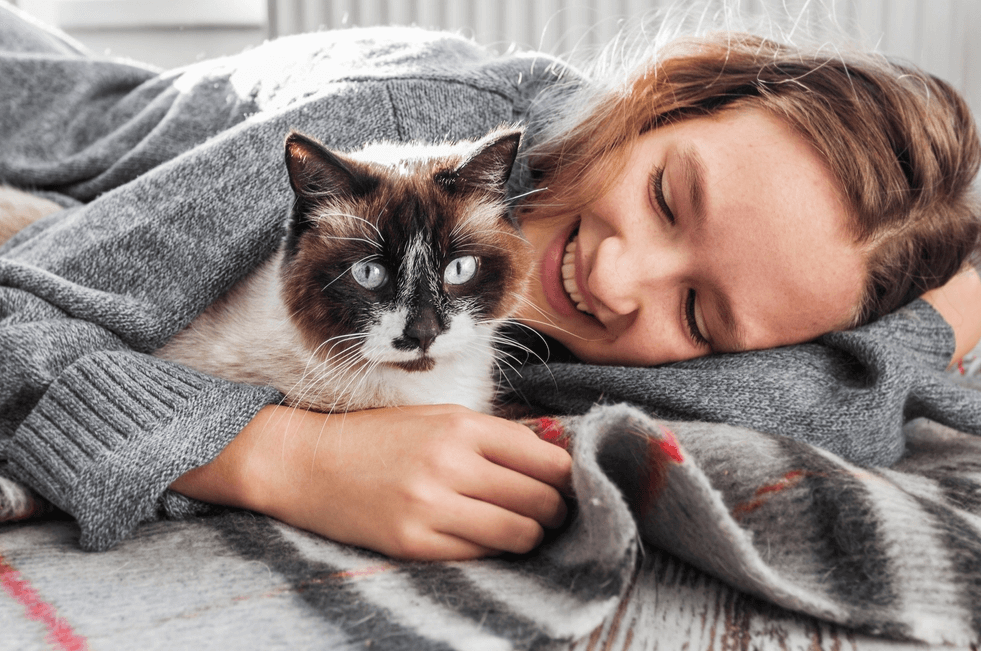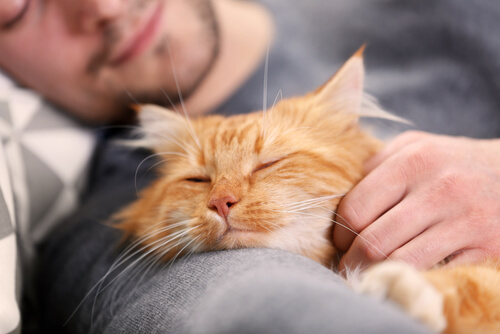Hygiene at Home with Your Pet

When it comes to hygiene at home with your pet, you have to be really on the ball. You may have become accustomed to hair on your clothes or your dog’s morning breath, but the goal isn’t so much to keep your home sparkling clean, but rather to prevent the spread of diseases. This applies no matter how many animals are in your home.
Therefore, whenever you live with a pet, you should have a strict cleaning routine. Although this varies depending on which animal you have, there are a number of basic guidelines that are valid for any multi-species household. Let’s look at them in detail.
Hygiene at home with a pet: measures to take

All family members, human or otherwise, will always benefit from a clean and well-kept environment. However, these hygiene measures don’t only apply to the house, but also to the pet itself and to you. Here are some useful tips to achieve this.
Although it isn’t always possible, ideally, each animal should have its own space, i.e., a room or area they can call “home”. This is where they’ll eat, rest and relax. This, besides increasing your pet’s quality of life, will act as a barrier to prevent the spread of diseases and other ailments, such as parasites.
If you don’t have a suitable area, then you should adapt part of your living area just for them. Although animals such as rabbits and parrots should be allowed to move around the house, it’s best for all of them to have a space reserved for activities such as eating, sleeping, and going to the toilet.
Daily cleaning
An area that animals use can’t be left without cleaning for more than a day or two. Keep in mind, for example, that their feces and urine aren’t flushed away, and are a potential agent of infection. Beyond that, consider the dirt they can carry on their paws, the hair they shed, and the pathogens present in their mouths.
Hygiene at home means that floors and surfaces should be sanitized every day. Elements such as feeders, beds, and toys should also be washed regularly, especially the feeders.
Pet hygiene at home
Some animals, such as cats and rabbits shouldn’t be bathed, but others, such as dogs, do need a bathing routine (and in general all those who go outside frequently). Check with your vet how often they should have a bath, so that you don’t cause any problems for them; bathing them too much can also be harmful.
Human hygiene
You probably know that some diseases travel between humans and non-humans, and in both directions. Therefore, take care of your own hygiene and, above all, remember to wash your hands frequently and always after handling your animal companion.
Some reptiles, such as turtles, can carry salmonellosis bacteria on their skin, so you should always wash your hands after touching them, even if they’re healthy.
Using specific products
Bleach and ammonia are generally never recommended for disinfecting spaces, as they encourage some species (such as dogs and cats) to urinate in those spaces. In addition, products with strong odors and corrosive chemicals can harm the health of small animals and those with an acute sense of smell.
Therefore, it’s always best to purchase specific products for homes with animals, which will eliminate pathogens, and keep both humans and animals safe at the same time. Your veterinarian will tell you which are the most suitable for your pet.
Is it good to use air fresheners?
Some owners find it difficult to maintain a pleasant ambient odor when caring for some animals, such as ferrets. When they can’t get used to these smells (which are entirely harmless), they often resort to air fresheners, candles, and so on. But how safe are they?
The truth is that it depends entirely on the species. From olfactory sensitivity to potential poisoning, what we think is a pleasant smell can be problematic for them. Therefore, before using these products, find out which substances could harm your pet’s health.
To sleep or not to sleep with your pet?

This is a controversial issue. It’s true that sleeping with your dog, for example, can be very beneficial for both of you, but, from the point of view of hygiene, it’s best to have separate beds. Some experts even advise separate rooms.
Even so, this question is up to each individual. What is recommended is, in case of bed sharing, to change sheets often and to air them and the room every day. Also remove hair in the case of dogs and cats.
Finally, remember that it’s important for the rooms used by your animals to be as simple as possible. Choose objects that can be put in the washing machine, furniture without holes underneath, closed storage spaces, and so on. When you have to clean every day without exception, it’s best to make things easy for yourself.
When it comes to hygiene at home with your pet, you have to be really on the ball. You may have become accustomed to hair on your clothes or your dog’s morning breath, but the goal isn’t so much to keep your home sparkling clean, but rather to prevent the spread of diseases. This applies no matter how many animals are in your home.
Therefore, whenever you live with a pet, you should have a strict cleaning routine. Although this varies depending on which animal you have, there are a number of basic guidelines that are valid for any multi-species household. Let’s look at them in detail.
Hygiene at home with a pet: measures to take

All family members, human or otherwise, will always benefit from a clean and well-kept environment. However, these hygiene measures don’t only apply to the house, but also to the pet itself and to you. Here are some useful tips to achieve this.
Although it isn’t always possible, ideally, each animal should have its own space, i.e., a room or area they can call “home”. This is where they’ll eat, rest and relax. This, besides increasing your pet’s quality of life, will act as a barrier to prevent the spread of diseases and other ailments, such as parasites.
If you don’t have a suitable area, then you should adapt part of your living area just for them. Although animals such as rabbits and parrots should be allowed to move around the house, it’s best for all of them to have a space reserved for activities such as eating, sleeping, and going to the toilet.
Daily cleaning
An area that animals use can’t be left without cleaning for more than a day or two. Keep in mind, for example, that their feces and urine aren’t flushed away, and are a potential agent of infection. Beyond that, consider the dirt they can carry on their paws, the hair they shed, and the pathogens present in their mouths.
Hygiene at home means that floors and surfaces should be sanitized every day. Elements such as feeders, beds, and toys should also be washed regularly, especially the feeders.
Pet hygiene at home
Some animals, such as cats and rabbits shouldn’t be bathed, but others, such as dogs, do need a bathing routine (and in general all those who go outside frequently). Check with your vet how often they should have a bath, so that you don’t cause any problems for them; bathing them too much can also be harmful.
Human hygiene
You probably know that some diseases travel between humans and non-humans, and in both directions. Therefore, take care of your own hygiene and, above all, remember to wash your hands frequently and always after handling your animal companion.
Some reptiles, such as turtles, can carry salmonellosis bacteria on their skin, so you should always wash your hands after touching them, even if they’re healthy.
Using specific products
Bleach and ammonia are generally never recommended for disinfecting spaces, as they encourage some species (such as dogs and cats) to urinate in those spaces. In addition, products with strong odors and corrosive chemicals can harm the health of small animals and those with an acute sense of smell.
Therefore, it’s always best to purchase specific products for homes with animals, which will eliminate pathogens, and keep both humans and animals safe at the same time. Your veterinarian will tell you which are the most suitable for your pet.
Is it good to use air fresheners?
Some owners find it difficult to maintain a pleasant ambient odor when caring for some animals, such as ferrets. When they can’t get used to these smells (which are entirely harmless), they often resort to air fresheners, candles, and so on. But how safe are they?
The truth is that it depends entirely on the species. From olfactory sensitivity to potential poisoning, what we think is a pleasant smell can be problematic for them. Therefore, before using these products, find out which substances could harm your pet’s health.
To sleep or not to sleep with your pet?

This is a controversial issue. It’s true that sleeping with your dog, for example, can be very beneficial for both of you, but, from the point of view of hygiene, it’s best to have separate beds. Some experts even advise separate rooms.
Even so, this question is up to each individual. What is recommended is, in case of bed sharing, to change sheets often and to air them and the room every day. Also remove hair in the case of dogs and cats.
Finally, remember that it’s important for the rooms used by your animals to be as simple as possible. Choose objects that can be put in the washing machine, furniture without holes underneath, closed storage spaces, and so on. When you have to clean every day without exception, it’s best to make things easy for yourself.
All cited sources were thoroughly reviewed by our team to ensure their quality, reliability, currency, and validity. The bibliography of this article was considered reliable and of academic or scientific accuracy.
- Acosta-Jurado, D. C., Castro-Jay, L. I., & Pérez-García, J. (2017). Parásitos gastrointestinales zoonóticos asociados con hábitos de higiene y convivencia en propietarios de caninos. Biosalud, 16(2), 34-43.
- Martín Abellán, A., & Anguas Gracia, A. Programa de educación para la salud: Zoonosis en mascotas, ¿un riesgo para la salud?
This text is provided for informational purposes only and does not replace consultation with a professional. If in doubt, consult your specialist.








